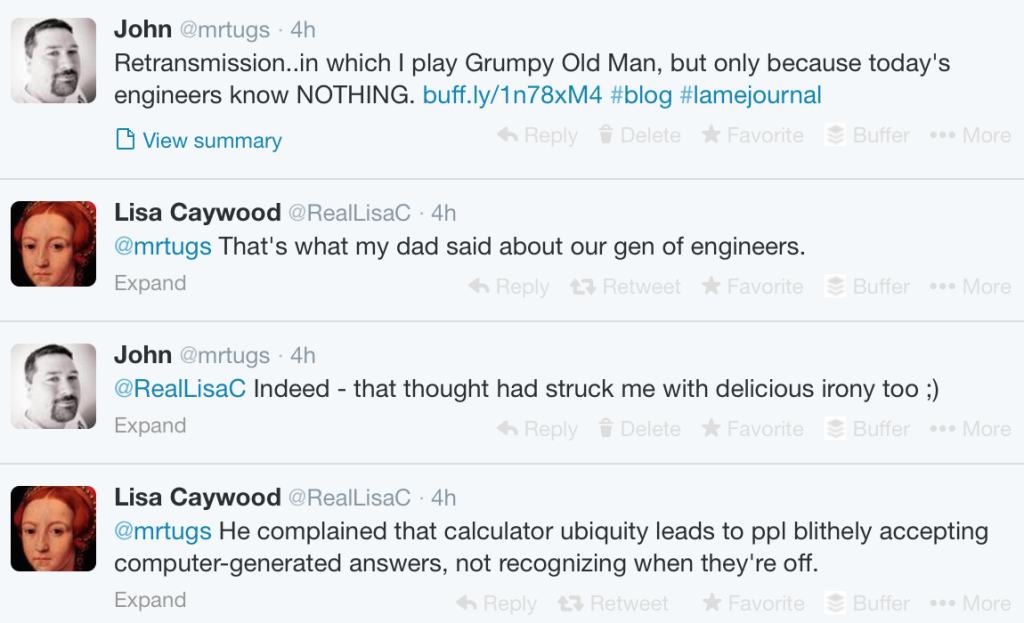
In my last post I put on my finest slacks, put in my teeth, and questioned whether the “youth of today” understand a dang thing about networking in any kind of detail below the concept of IP.
Apart form the obvious fact that I like to whine about young whippersnappers, why, you may wonder, did I let rip on that particular topic?
Before I dig into that, I will explain that I have split this post and will publish a few pieces on different days, mainly so that it isn’t a wall of text (at least, no more than usual). So what’s the first reason I raised this topic?
1. Because It Needs to Be Said
Yeah, it really does. There does seem to be a trend (and there are always exceptions) towards newer engineers not understanding the underlying technologies behind routing and switching. That said, no one of us is immune to this problem. The wonderful Lisa Caywood (@RealLisaC) voiced a thought I’d also had:
Her father is absolutely right. I couldn’t put an Ethernet signal on a scope and figure out what’s going wrong with it, but the last generation of network engineers probably had to although Ethernet was running a little slower not so long ago! I have not had to worry about the algorithms behind CSMA/CD for years because thank goodness everywhere runs switches now rather than hubs/repeaters. Does this make me a worse network engineer? I’ll let you argue that amongst yourself for a moment (and try not to make it personal please!), but from my perspective I believe I do fine, so what does it matter if I can’t grab an oscilloscope and diagnose an Ethernet issue? It’s not relevant any more, and the advances in technology also mean I carry around fewer 10base2 terminators in my bag. Know what I mean? (Younger readers may want to visit Wikipedia’s 10base2 page if you don’t know what I’m on about).
So perhaps if I believe that scoping Ethernet is irrelevant to my job today, I have to accept that not knowing ARP is irrelevant to the next generation of engineers. But dangit, it seems wrong somehow. Not knowing SPX/IPX, DECNet or Appletalk? No problem! They’re irrelevant because almost nobody uses them any more, and the same applies to Thinnet and the like. But with IP being the ubiquitous protocol in use globally, it does kind of irk me that somebody might not wonder how things work. It is reasonable to expect somebody to understand how traceroute works, for example? And understanding the difference between a CAM table and an ARP table is not frivolous, it’s operationally critical at the moment. But will it be in 5 years? Food for thought.
Photography
If I might make an analogy with photography, “my” generation of photographers may have started out with film, but rapidly adopted digital photography and take it for granted now. The young’uns now most likely don’t know the smell of developer and have never used any kind of emulsion based film or photosensitive paper, assuming they even know that these things exist. Does their lack of ability to process film make them worse photographers? Perhaps not, but they would undoubtedly approach photography from a different angle (no pun intended).
I read an article recently which I’m failing to locate so I can reference it, but the gist of it was that the photography magazine brought together a bunch of professional photographers from this generation and the previous generation, and let them all go and take digital photographs together. The commentary noted that while all the photographers got great results, in each location or scene that was being shot not only did the older photographers capture fewer images, but the last photograph that was taken was typically the image they chose to submit. In other words, they knew when they had nailed the shot, and walked away from it. The younger photographers kept on snapping away. It’s just how they were brought up; the medium format-loving older photographers knew that film and processing were expensive, so they were trained to take fewer, better, pictures; and they carried that right on into their digital photography.
To Be Continued
Short(-ish) and sweet. More tomorrow!


Frankly it was the smell of the stop bath that always got me going. Mmm… Salt & Vinegar…
I love the smell of the dark room. I was going to say that I like sniffing chemicals, but I feared that might give the wrong impression. 😉 When I get a whiff of those solutions though, it engages my brain’s wonderful ability to trigger memories based on smell, and boy does it ever. Happy times.
Ah – the darkroom. Used to work in one, a professional lab. Some observations:
– being stuck for 1 hour 20 minutes in an Ektachrome processing line, in the dark. I did not appreciate the smell. All the running water used to make me really want to pee…
– I remember once lighting up a cigarette in a completely dark printing room, only to see an open box of Cibachrome paper …
– being able to use Photoshop (version 1.x) to grab the curves of an HD (Hurter-Drittfield) plot to change the colour-balance/densities (seconds …), without having to run an Ektachrome test-strip through a colour processor, read the test strip via a densitometer, and then figure out how much I would have to change the PH of the colour developer to optimize the colour balance (2 hours)…
– using water-baths in black-and-white development to decrease the contrast when processing film (sheet and roll) – edge and adjacency effects …
– any “photographers” remember about the Scheimpflug (spelling?) principle, especially when related to architectural photography?
Funny how all this comes rolling back up when ever I can smell the vinegar, usually from fish-and-chips … 🙂 Now I’m “in” networking – thoroughly enjoying it – but like you, seeing the same lack of “attention” to detail. Maybe I’m just “grumpy” too, but I know I’ve earned it 🙂
Kim
(And now I’m hungry for potato chips. Cheers, Andy)
Im not sure if I fall into your “young wipper-snapper” category or not (Im 34 yo) but I dont disagree with your point completely.
Maybe you are painting this picture with too broad a brush. Sure a large number of “network engineers” I run into cant tell the difference between a frame and packet or cant really explain the difference between a switch and router but that dosent mean everyone is that way.
There are still those of us who push to know as much as we possible can and drive ourselves to be the best at what we do.
Great couple post and Im enjoying the conversation!
I think you’re being a grumpy old man.
Bad engineers don’t understand the full stack. Good engineers do. This has little to nothing to do with age, rather a combination of experience + drive to learn (And partially environment – can you expect something to know the operational strengths/weaknesses of a vendors DWDM gear if their org does not deploy it?).
I go through this all the time. I hear the This isn’t documented!! all the time and I just want to reach out and smack them in the foot with my cane and respond ” Documentation!?!? Documentation!?!? When I was young, we had nothing but a console cable, a foundational understanding of how networking was supposed to work and a QUESTION MARK!!!!! And you want documentation!!?!?!? Go install wireshark kid!!!! ”
More seriously though, I think that each generation builds up a set of knowledge that should be passed down to the next generation, and there’s a bunch of knowledge that simply falls off the vine because it’s not really needed anymore. I don’t know anyone who’s actually put a scope on a wire in the last 15 years outside of an academic environment. I think that knowledge isn’t NEEDED anymore, they fixed the problems to the point where we can address the next series of problems to the point that *hopefully* the next generation won’t have to worry about them.
To be honest, I think we have done that to some extent by eliminating most of the competing L3 protocols and standardizing the world on IPv4. New engineers need to focus on the way that IP works, rather than worrying about how all the other L3 protocols worked. ( I really hated IPX/SPX addresses. Drove my CRAZY ).
The older generation needs to think clearly about what skills that we learned needs to be passed down and then step up and become the elders in our tribal knowledge circle.
The great thing is there’s people who are putting down this knowledge in written form so that more people from the next generation are able to sit around the campfire and listen to the tales of yore.
hmmm.. why I do I suddenly have a craving for chocolate, graham crackers and marshmallows?….
*laughs* Chris, I try to LART the young’uns when they step outta line, but they just don’t get it.
IPX/SPX made me smile only because you got to make silly network ‘names’ like DE:AD:BE:EF and 0B:AD:F0:0D and occasionally B1:6B:00:B5. Who wouldn’t love a protocol like that? It’s a bit like trying to write things upside down on a calculator… 710.77345, 0.7734 and 5318008 (do you spot a theme here? ;-). But you’re right that at least we only have one protocol to worry about and at a low level for the most part it Just Works, and perhaps not having to fill your mind up with that knowledge means you can fill it up with something more interesting instead, like upside down calculator words.
I think you make a great point that we need to figure out what’s important to distill and teach, and what can be left as “old engineer stuff” that we can drone on about in the retirement home while we nurse a fond memory. Or fondle a nurse. Wait, that may not be legal. Well, keep a place for me at your campfire. Of course, the young people today have no idea what makes a good S’more, etc., etc…
What is basic knowledge? Sometimes we think we know or that we one day knew and than all of a sudden have lots track of the evolution of things. I for one can honestly say that my technical and factual knowledge doesn’t span a lot further than 3 to 5 years back. End even then you sometime shave to digg into your memories.
A second point is what is common knowledge? I suppose OSI layers and packets versus frames or troubleshooting a wireshark capture is common knowledge for a networking engineer but how far do you have to go? And go back?
I recently got in touch with a few new technologies that to be able to understand what they at heart meant or to see their true value I had to accept that I missed some basic and common knowledge of which I hardly forgot I didn’t know in the first place. I wrote that down here: http://hansdeleenheer.com/you-startups-challenge-my-basic-knowledge/